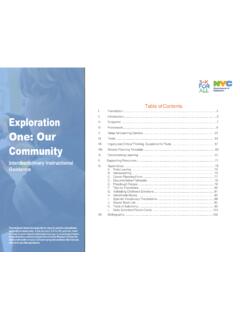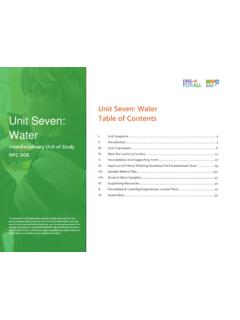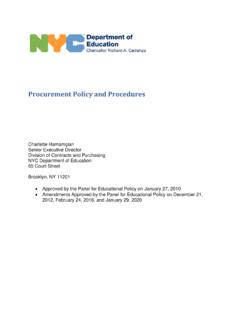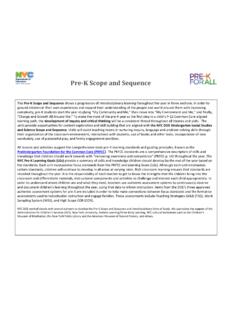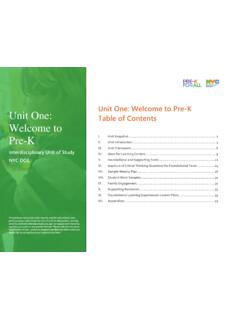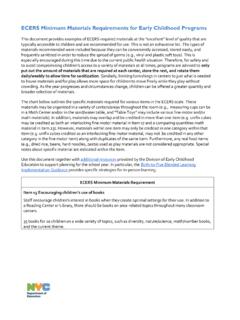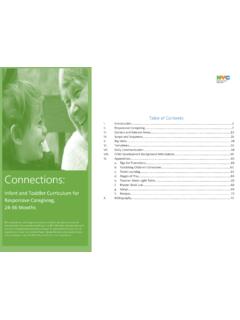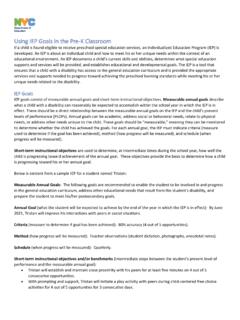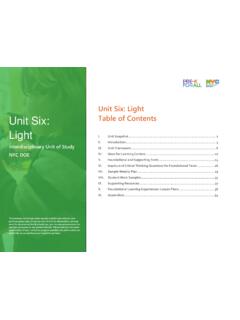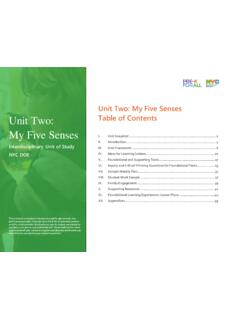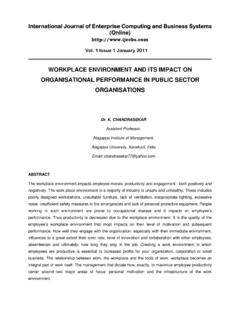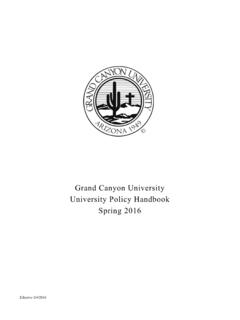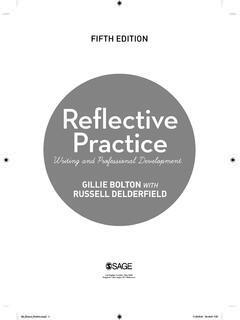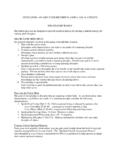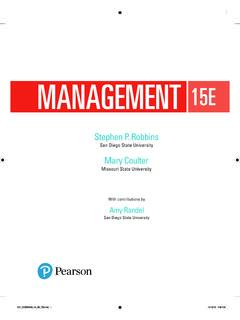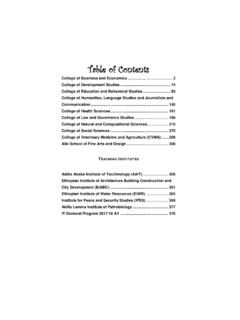Transcription of Family Child Care Network (FCCN) Handbook
1 Family Child Care Network (FCCN) Handbook1 IntroductionNew York City has one of the strongest and largest early care and education systems in the country. A majority of children and their families are served by community-based programs that contract with the Department of Education (DOE) to offer early care and education that reflects the strengths and meets the needs of New York City s diverse neighborhoods. Over the last decade, New York City has invested in initiatives to support and advance early care and education programs for children. The City has now brought all birth-to-5 early care and education services under the management of the DOE with the goal of increasing quality, equity, access, and sustainability for all children. Family Child care programs now have the opportunity to provide services to families in need of subsidised Child care as well as 3-K for DOE is committed to supporting and enhancing the strengths of Family Child care as birth 3 programs that promote continuous and responsive relationships, bolster early learning skills, build resiliency, and lay the foundation for all future learning.
2 This Handbook will assist your Network by (1) clearly articulating pertinent policies, and (2) highlighting operational guidance and promising practices on a variety of topics to support your staff and affiliated providers in operating high-quality EarlyLearn (infants and toddlers) and 3-K Handbook represents our commitment to support programs in delivering high-quality early childhood education. It is grounded on the Division of Early Childhood Education (DECE) Early Childhood Framework for Quality (EFQ), which defines the DOE s vision for high-quality early childhood education in NYC. Networks in collaboration with the DOE will be supported to implement all content from this Handbook and quality expectations as set forth in the aim to amplify the work of Family Child care providers as respected and valued professionals within the early care and education system of New York City.
3 Thank you for your partnership in delivering high quality Family Child care support value your input and want this to be an effective resource for your Network . If you have any questions or feedback, please either contact your Family Child care support manager or send an email to of ContentsI. Staffing 5 Network Staff Qualifications ..6 Network Staff Security Clearances ..7 Affiliated Provider Staff Qualifications ..9 Affiliated Provider Comprehensive Background Clearances ..9 Affiliated Provider Program Supervision and Ratio Requirements ..11 Affiliated Provider Agreement Process ..13II. Coaching & Network Support 15 Strengths and Relationship-Based Practices within Networks.
4 16 Coaching Expectations within Affiliated Provider Homes ..16 Coaching Visits ..17 Coaching Documentation and Reflection ..17 Early Childhood Framework for Quality ..17 III. Professional Learning 19 Professional Learning for Network Staff ..20 Training Topics Mandated by OCFS for Affiliated Providers ..20IV. Program Oversight 23 Calendar and Hours of Operation ..24 Enrollment and Eligibility ..26 Attendance ..31 Meals and CACFP Participation ..32 Program Assessments ..38 Data Management Systems and Child Privacy ..38V Health and Safety 39 Affiliated Provider Licenses and Registrations.
5 40 Affiliated Provider Program Facilities ..40 Safety and Security: Plans and Procedures ..43 Monitoring and Support ..46 Incident Reporting ..49 Staff and Child Health Requirements ..50 Routine Care of Children ..56 Child Abuse Prevention and Reporting ..60VI. Family Engagement 67 Communication at the Beginning of the Program Year ..68 Monthly Family Involvement ..70 Families-As-Partners ..71 Family -Provider Conferences ..72 Family Feedback Opportunities ..73 Connections to Community Resources ..73 Planning for Next Educational Steps ..74 VII. Instructional Programming 75 Mixed-Age Curriculum.
6 76 Indoor Environment and Schedules ..78 Nap and Rest Time ..82 Outdoor Play and Neighborhood Walks ..83 Screen Time ..84 Uniforms ..84 Child Positive Behavior Guidance ..85 VIII. Screening & Authentic Assessment 87 Screening ..88 Screening Tool and Administration ..88 Communicating with Families ..89 Authentic Assessment ..92IX. Special Education 95 Special Education Services ..96X. Additional Support Services 101 Language Services ..102 Immigrant Populations.
7 102 Students in Temporary Housing ..103 Appendix 105 Family Child Care Early Childhood Framework for Quality ..106I Staffing Network Staff Qualifications Network Staff Security Clearances Affiliated Provider Staff Qualifications Affiliated Provider Comprehensive Background Clearances Affiliated Provider Program Supervision and Ratio Requirements Affiliated Provider Agreement Process 6 StaffingHigh quality Family Child Care (FCC) Networks are staffed by professionals that meet required qualifications and are able to effectively provide support and services to affiliated Family Child care programs. This dedicated staffing provides a unique opportunity to strengthen care for infants, toddlers, and three-year-olds in New York City.
8 The professional and supportive relationships between the staff of the Network and the affiliated providers are essential to enhancing interactions with children and families as well as the overall functioning of each individual Family Child care program. The below policies outline the requirements for staffing your Network as well as the Network s role in ensuring that all affiliated providers have the necessary credentials. Network Staff QualificationsCurrent Network staff who do not meet the qualifications described below must be reviewed and approved to fulfill responsibilities outlined in the DOE contract on a case-by-case basis by the DOE, based on credentials, experience, study plan, and other relevant factors. Network Director - Responsible for all aspects of program management and implementation including compliance, audits, supervision, professional development, affiliated provider recruitment, Family services, and enrollment.
9 Must have: A Master s Degree in Social Work (MSW) or Education (MSEd) with a concentration in Early Child -hood Education; and Relevant experience working in Family Child care and/or infant/toddler care. Education Director - Responsible for supporting educational services in Family Child care settings by overseeing the implementation of regular coaching visits to affiliated providers; providing guidance and professional learning on the implementation of an appropriate mixed-age, evidence-based curriculum that supports infants, toddlers, and 3-K for All services; and supervising and mentoring education specialists. Must have: A Master s Degree in Education (MSEd) with a concentration in Early Childhood Education; and Teaching license or certificate valid for services in the early childhood or childhood grades pursuant to New York State regulations.
10 Education Specialist - Responsible for providing coaching visits to affiliated providers at least twice per month, with each visit lasting for at least 90 minutes; supporting the planning and implementation of an evidence-based curriculum within a mixed-age home-based setting; providing support and guidance on teaching and instruction, responsive practices, Family engagement, mental health, and additional areas related to the care and instruction of all children in the program. Networks should employ at least one Education Specialist for every 17 affiliated have: A minimum of a Bachelor s degree in Early Childhood Education or infant/toddler studies; and Early childhood teaching Health/Nutrition/Safety Monitoring Specialist - Responsible for monthly home visits to all affiliated providers to support and ensure compliance with the Office of Children and Families (OCFS), the Child and Adult Care Food Program (CACFP), DOE policies, and other applicable requirements under the guidance of the Network Director or Education Director.
